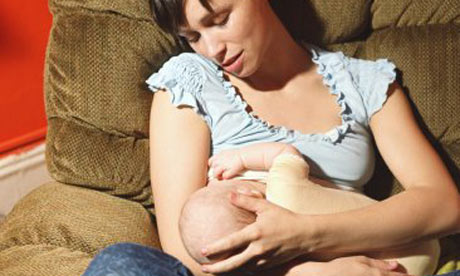 I have avoided talking about my opinions about breastfeeding this far, firstly, because of not wanting to offend or upset anybody who hasn't breastfed, particularly friends and members of my family, who I know think and feel very deeply about their choices and their children. The other is a cowardly reason: because I don't want to receive the backlash I've seen elsewhere towards those who support breastfeeding, being described as "middle class do-gooders" and the like.
I have avoided talking about my opinions about breastfeeding this far, firstly, because of not wanting to offend or upset anybody who hasn't breastfed, particularly friends and members of my family, who I know think and feel very deeply about their choices and their children. The other is a cowardly reason: because I don't want to receive the backlash I've seen elsewhere towards those who support breastfeeding, being described as "middle class do-gooders" and the like.Well, I suppose I've opened the floodgates now because I am going to talk.
In a series of blogs, I'm going to try to talk about my experiences and views on breastfeeding. Firstly, I'm going to describe how I got to this blog subject, and later my ideas for why breastfeeding is not the norm for every mother and baby.
Two recent articles that have prompted my decision to write about this are:
- Daily Mail: Breastfeeding boom: Middle-class mothers lead the charge with 90% rejecting formula milk, by Sophie Borland.
- New York Times: The Breast Milk Cure, by Nicholas D Kristof.
The first article presented the latest UK statistics on the number of mothers who start their babies on breastmilk, reporting higher levels of breastfeeding amongst middle class women, and describing a lower proportion of breastfeeding mothers amongst those with 'routine or manual jobs, ... those who have never worked and teenage mothers'. What was hard to read was the level of aggression in the comments to the article.
For example:
[One thing I'll say quickly now is that most try to breastfeed discretely, not with 'breasts bulging', so those private nursing women would go unnoticed by Lili (above), those who were noticed may have just not got the hang of being discrete yet.]The middle class Taliban sitting with breast bulging with milk and looking down there nose at any one who does not follow them,it should be a choice and yes the parent should be able to feed there chid breast or formula. This is the middle class dogooders at there best
My main beef is with the mothers (and others) who preach that the issues some of us face do not actually exist, or wouldn't exist if we only ate and drank right or got treatment etc. Women in my situation already feel bad enough, inadequate as mothers and emotionally squashed, without effectively being told that we're either lazy or ignorant! That's the kind of attitude that needs to stop.
The biggest problem is that many mothers believe that breast milk isn’t enough, and that, on a hot day, a child needs water as well. On a rural road near the remote town of Dogon Doutchi, in southern Niger, we ran into a family of Tuareg nomads traveling north.“On a hot day, babies need water,” Gayshita Abdullah, the mother, told me. She said she tries to get water from a well, but if there is no well nearby she gets it from a mud puddle.
In fact, most nutritionists are adamant that babies are best off with nothing but breast milk for the first six months of life (they used to recommend four months, but now say six months). And water in poor countries is often contaminated and dangerous for a baby.The article opened up my awareness of the low levels of breastfeeding currently going on globally, not just in western cultures. It also highlighted similarities in the reasons behind such reduction in the numbers of mothers that breastfeed. Namely, myths and misinformation.
Even when the mother is herself malnourished, her body will normally provide enough milk for a baby, nutritionists say.
In the UK at least, this is added to by the:
- Heavy marketing campaigns of formula companies
- Lack of education
- Stagefright
- Lack of support
- Over reliance on science
- Convenience of not breastfeeding
- Increased sexualisation of breasts

Hi Anna - interesting reading and an important topic for more than just Mums and Mums-to-be! I happened across this t'other day and thought you might find it interesting. http://casaubonsbook.blogspot.com/2007/12/52-weeks-down-week-30-nurse-and.html
ReplyDeleteHi thanks for highlighting that - it isn't just Mums and Mums to be that influence and are affected by the decision to breastfeed or not. I should have written more about the huge contribution of the men in mums' lives (partners, fathers, brothers, friends). Thanks for the link. Anyone helping Mums to have the time to feed as their child needs it is making a big contribution.
ReplyDelete